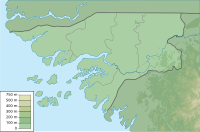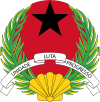2003 Guinea-Bissau coup d'état
| 2003 Guinea-Bissau coup d'état | |||||||
|---|---|---|---|---|---|---|---|
 Map of Guinea-Bissau. | |||||||
| |||||||
| Belligerents | |||||||
|
| |||||||
| Commanders and leaders | |||||||
| Kumba Ialá | Veríssimo Correia Seabra | ||||||
| Casualties and losses | |||||||
"ARMADURA Z29 HELMET ARMOR Z29" by OSCAR CREATIVO | |||||||
Nexus of coup in Bissau (marked green), Guinea-Bissau | |||||||
The 2003 Guinea-Bissau coup d'état was the bloodless military coup that took place in Guinea-Bissau on 14 September 2003, led by General Veríssimo Correia Seabra against incumbent President Kumba Ialá. Seabra referred to the "incapacity" of Ialá's government as justification for the takeover, together with a stagnant economy, political instability, and military discontent over unpaid salaries.[1][2] Ialá publicly announced his resignation on 17 September,[2] and a political agreement signed that month prohibited him from participating in politics for five years. A civilian-led transitional government led by businessman Henrique Rosa and PRS secretary general Artur Sanhá was set up at the end of September.[3][4]
Analysis
[edit]The coup was largely seen as inevitable due to the deteriorating living conditions and erratic behavior of President Kumba Ialá, which had led to severe political instability and economic mismanagement. Although the international community condemned the unconstitutional seizure of power, there was a general acknowledgment that the coup was a necessary intervention to prevent further chaos, as democratic norms had been repeatedly violated under Ialá's regime.[5]
See also
[edit]- History of Guinea-Bissau
- Saloum (film), a 2021 film set during the coup
References
[edit]- ^ "GUINEA-BISSAU: Army ousts president who kept delaying elections", IRIN, 14 September 2003.
- ^ a b Bissau junta set to step down, BBC News Online, 18 September 2003.
- ^ "Interim government takes over Bissau", BBC News Online, 28 September 2003.
- ^ "GUINEA-BISSAU: Junta insists on Artur Sanha as prime minister", IRIN, 23 September 2003.
- ^ Ferreira, Patrícia Magalhães (2004). "Guinea-Bissau: Between conflict and democracy". African Security Review. 13 (4): 44–56. doi:10.1080/10246029.2004.9627317. ISSN 1024-6029.


